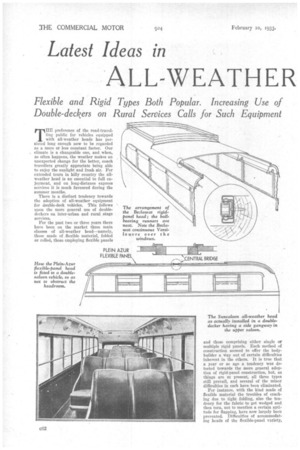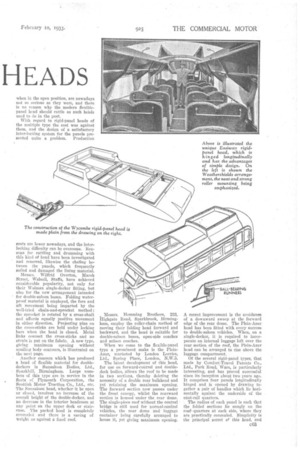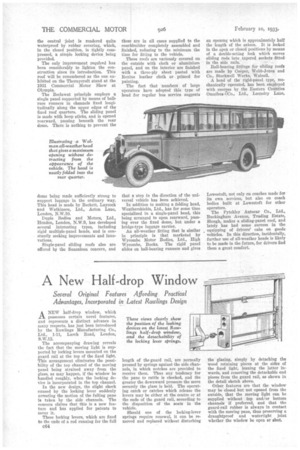Latest Ideas in
Page 112

Page 113

Page 114

If you've noticed an error in this article please click here to report it so we can fix it.
ALL-WEATHER
TEE preference of the road-travelling public for vehicles equipped with all-weather heads has persisted long enough now to be regarded as a more or less constant factor. Our climate is a changeable one, and when, as often happens, the weather makes an unexpected change for the better, coach travellers greatly appreciate being able to enjoy the sunlight and fresh air. For extended tours in hilly country the allweather head is an essential to full enjoyment, and on long-distance express services it is much favoured during the summer months.
There is a distinct tendency towards the adoption of all-weather equipment for double-deck vehicles. This follows upon the more general use of doubledeckers on inter-urban and rural stage services.
For the past two or three years there have been on the market three main classes of all-weather head—namely, those made of flexible material, folded or rolled, those employing flexible panels and those comprising either single or multiple rigid panels. Each method of construction seemed to offer the bodybuilder a way out of certain difficulties inherent in the others. It is true that a year or so ago a tendency was detected towards the more general adoption of rigid-panel construction, but, as things are at present, all three types still prevail, and several of the minor difficulties in each have been eliminated.
For instance, with the kind made of flexible material the troubles of cracking due to tight folding, also the tendency for the fabric to get wedged and then torn, not to mention a certain aptitude for flapping, have now largely been prevented. Difficulties of accommodating heads of the flexible-panel variety,
when in the open position, are nowadays not so serious as they were, and there is no reason why the modern flexible. panel head should rattle as such ho-ads used to do in the past.
With regard to rigid-panel heads of the multiple type the cost was against them, and the design of a satisfactory inter-locking system for the panels presented quite a problem. Production costs are lower nowadays, and the interlocking difficulty can be overcome. Reasons for rattling and drumming with this kind of head have been investigated and removed, likewise the chafing between the panels, which frequently soiled and damaged the lining material.
Messrs. Wilfrid Overton, Marsh Street, Walsall, Staffs, have achieved considerable popularity, not only for their Walinan single-decker fitting, but also for the new arrangement intended for doable-saloon buses. Folding waterproof material is employed, the fore and aft movement being imparted by the well-tried chain-and-sprocket method ; the sprocket is rotated by a cross-shaft and affords equally positive movement in either direction. Projecting pins on the cross-sticks are held under locking bars when the head is closed. Metal links connect the cross-sticks and no strain is put on the fabric. A new type, giving maximum opening without spoiling body contours, is illustrated on the next page.
Another concern which has produced a head of flexible material for doubledeckers is Sunsaltam Bodies, Ltd., Sparkhill, Birmingham. Large numbers of this type are in service in the fleets of Plymouth Corporation, the Scottish Motor Traction Co., Ltd., etc. 'The Sansaloon head, whether it be open or closed, involves no increase of the overall height of the double-deeker, and no decrease in the interior headroom at any point on the upper deck or staircase. The packed hood is completely concealed and there is a saving of weight as against a fixed roof.
_ Messrs. gemming Brothers, 233, Highgate Road, Sparkbrook, Birmingham, employ the roller-Chain method of moving their folding head forward and backward, and the head is suitable for double-saloon buses, open-side coaches and saloon coaches.
When we come to the flexible-panel type a prominent make is the PleinAzar, marketed by London Lorries, Ltd., Spring Place, London, N.W.5.
The latest development of this ,head, for use on forward-control and doubledeck bodies, allows the roof to be made in two sections, thereby deleting the necessity of a double rear bulkhead and yet retaining the maximum opening. The forward section now passes under the front canopy, whilst the rearward section is housed under the rear dome. The single-piece roof without the central bridge is still used for normal-control vehicles, the rear dome and luggage container being carefully arranged to house it, yet giving maximum opening.
A recent improvement is the avoidance of a downward sweep at the forward edge of the rear dome. The Plein-Azur head has been fitted with every success to double-saloon vehicles. When, on a single-decker, it is required to incorporate an internal luggage loft over the rear section of the roof, the Plein-Azur head can be arranged to rise above the luggage compartment.
Of the several rigid-panel types, that made by Comfort-Travel Patents Co., Ltd., Park Road,. Ware, is particularly interesting, and has proved successful since its inception about two years ago. It comprises four panels longitudinally hinged and is opened by drawing together a pair of handles which lie horizontally against the underside of the cant4all quarters.
The radius of each Liana is such that the folded sections lie snugly 'on the roof-, quarters at each side, where they• are .practically concealed. Simplicity is the principal secret of this head, and the central joint is rendered quite waterproof by rubber covering, which, in the closed position, is tightly compressed, a simple locking device. being
provided. ov
The only improvement required has been considerably to lighten the construction since its introduction. This roof will be remembered as the one exhibited on the Thornycroft stand at the 1931 Commercial Motor Show at Olympia.
The Beclawat principle employs a runners i
single panel supported by means of ballrace runn channels fixed longitudinally along the upper edges of the used roof quarters. The sliding panel is made with hoop sticks, and is opened rearward, passing beneath the rear dome. There is nothing to prevent the dome being made sufficiently strong to support luggage in the ordinary way. This head is made by Beckett, Laycock and Watkinson, Ltd., Acton Lane, N London, .W.10. Duple Bodiesand Motors, Ltd., Hendon, London, N.W.9, has developed several interesting types, including con stantly multiple-panel heads, and is seeking improvements and inno
vations. Single-panel sliding roofs also are offered by the Sunsaloon concern, and
these are in all cases supplied to the coachbuilder completely assembled and finished, reducing to the minimum the time for fitting to the vehicle. These roofs are variously covered on the outside with cloth or aluminium panel, and on the interior are finished with a three-ply sheet pasted with Rexine leather cloth or primed for painting.
The fact that numbers of large operators have adopted this type of head for regular bus service suggests
that a step in the direction of the universal vehicle has been achieved. In addition to making a folding head, Weathershields, Ltd., has for some time specialized in a single-panel head, this being arranged to open rearward, passing over the fixed dome, but under a bridge-type luggage carrier. An all-weather fitting that is similar in principle is that marketed by Wycombe Motor Bodies, Ltd., High Wycombe, Bucks. The rigid panel slides on ball-bearing runners and gives
an opening which is approximately half the length of the saloon. It is locked in the open or closed positions by means of a double-acting lock which moves sliding rods into tapered sockets fitted, in the side rails.
Ball-bearing fittings for sliding roofs are made by Cooper, Webb-Jones and Co., Stockwell Works, Walsall.
A head of the rigid-panel type, mechanically operated, has been employed with success by the Eastern Counties Omnibus :Co., Ltd., Laundry Lane, Lowestoft, not only on coaches made for its own services, but also on coach bodies built at Lowestoft for other operators.
The Pytchley Autocar Co., Ltd., Buckingham Avenue, Trading Estate,
makes roof, Slough, mes a sliding-panel of, and lately has had some success in the g equippin of drivers' cabs on goods vehicles. In this direction, incidentally, further use of all-weather heads is likely to be made in the future, for drivers find them a great comfort.




































































































































































